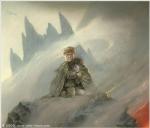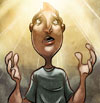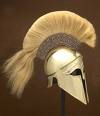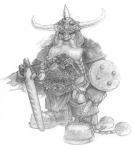My criticism has to do with the treatment of two pivotal characters in this tale, and the ending of the book and, consequently, series.
First, the two pivotal characters I'm talking about are Maati Vaupathai and Otah Machi. At the end of An Autumn War, Otah Machi is made emperor over all the cities of the Khaiem. Conversely, Maati Vaupathai is an outcast and utter pariah. The Price of Spring follows the unfolding of these two lives, under these two different sets of circumstances, in their elderly years.
Otah Machi is portrayed as the suffering leader, born to these times, with the requisite wisdom to steer through such harrowing events while enacting wide ranging cultural changes, all for the better. Maati Vaupathai is the throwback to an era of hubristic naiveté and arrogance where the powerful thoughtlessly wielded the andat with no consideration of the consequences. I found it rather heavy-handed.
This touches upon a colossal pet peeve of mine: the viewing of the past through the lenses of the present in levying judgment. Let me be clear before I get too far into this: I agree with all of the choices Otah Machi made and would have made them myself, but for different reasons. I saw the cultural changes as necessary for survival. Otah Machi, as presented in the story, comes off belligerently proud of being iconoclastic. Iconoclasm has no intrinsic virtue. Iconoclasm, as an end unto itself, cannot even have virtue extrinsically credited to it. Iconoclasm, I posit, is only the outward, physical manifestation of immaturity, impatience, petulance and a sorrowful lack of respect, experience and/or wisdom. The treatment of the past with such contempt is….contemptible. Just imagine the blood, sweat, tears, sorrows, achievements, losses, victories, sufferings, joys and accomplishments of your own life being marginalized by someone not yet born and who wasn't even there. Piss on the past and suffer your own experiences to be grist for some future mill. It may sound like a rant, but my passion for history (my undergraduate degree), good history, as in a discipline to be reverentially practiced with skill, is that deep. Thus the notion of iconoclasm, and its practitioners, is worth less than nothing to me.
What's so bad about the ending? Nothing, if you like your endings Pollyannaish. The emperor dies of old age. His son, married to the daughter of a leading house of Galt, becomes the next emperor. All of the women in the empire are healed. All of the men in Galt are healed. Both cultures learn to be tolerant of each other and extraordinarily valuable lessons in wisdom are learned. Sure, there are those who aren't on-board with the emperor's designs, but they are clearly conspiring in the shadows and no match for the insight, wisdom and intelligence of the reigning powers to unmake such progress, or so the author has made them. All of the unwise, if not ignorant, sins of the past (i.e. andats) have been forever cast off. It's unadulterated, overly-simplistic, wish-fulfillment. It wouldn't be such a snag for me if it had occurred in a series that hadn't been bordering on profound greatness.
For Otah, there is (or is at least meant to be) a touching scene where Danat reads through all of his father's correspondence to his mother, written after his mother's passing. Danat keeps the letters and, in the end, is the one to touch the torch to his father's pyre. Otach Machi – a great man for a tough time. Ugh and puke, there should be a yellow flag for a fifteen yard penalty and loss of down in there somewhere.
By contrast, Maati Vaupathai loses his only child (technically, a biological son of the emperor who never really cared). Maati loses Liat, his lover, not once but twice. His final years of life are spent on the run as an outlaw, pariah and, finally, a prisoner. Maati lost everything one person can lose, all in the pursuit of serving others and doing what his conscience demanded was right. More often than not, doing what Otah Machi commanded him to. Maati was, without a doubt, a bitter old man at the end, but wear that suit for a week and tell me how it fits. Maati's final scene? The petulant, doddering, aged man-child of an emperor, by order, has Maati removed from his cell (but it's a very, very nice cell) and brought up to some parapet where he and the emperor look out over the city on Candles' Night. The surly, but suitably ashamed and disgraced former poet looks to the gregarious and gracious (tongue in cheek here, c'mon, get it) emperor and says, "Thank you." I'm not kidding. I'm not making this up.
It's been several days since I completed reading this book and I still don't believe it. I was 75% of the way to reading one of the best series ever.
Verdict: Poor to Fair

 Help
Help



















